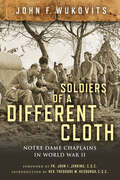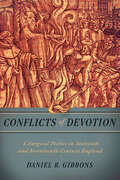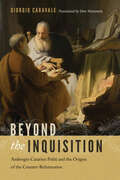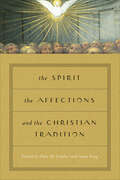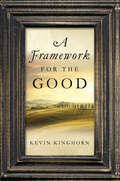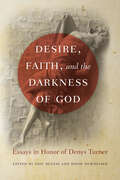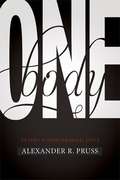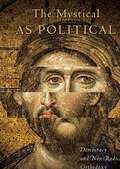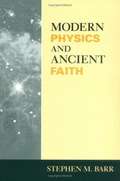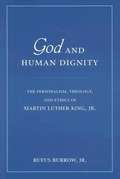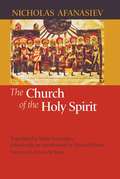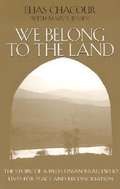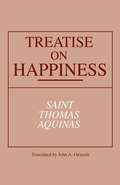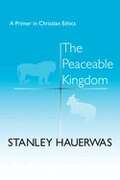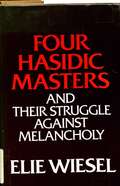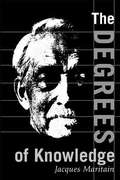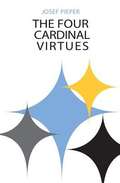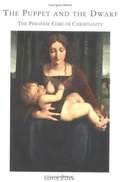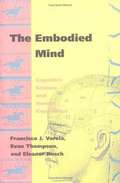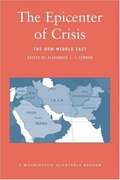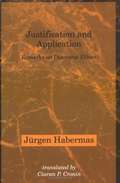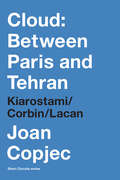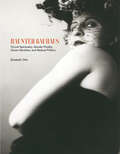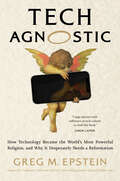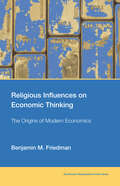- Table View
- List View
Soldiers of a Different Cloth: Notre Dame Chaplains in World War II
by John F. Wukovits&“This riveting account of the heroic contributions of thirty-five chaplains and missionaries during World War II is nearly impossible to put down . . . inspiring.&” —The Boston Pilot In Soldiers of a Different Cloth, New York Times-bestselling author and military historian John Wukovits tells the inspiring story of thirty-five chaplains and missionaries who, while garnering little acclaim, performed extraordinary feats of courage and persistence during World War II. Ranging in age from twenty-two to fifty-three, these University of Notre Dame priests and nuns were counselor, friend, parent, and older sibling to the young soldiers they served. These chaplains experienced the horrors of the Death March in the Philippines and the filthy holds of the infamous Hell Ships. They dangled from a parachute while descending toward German fire at Normandy and shivered in Belgium&’s frigid snows during the Battle of the Bulge. They languished in German and Japanese prison camps, and stood speechless at Dachau. Based on a vast collection of letters, papers, records, and photographs in the archives of the University of Notre Dame, as well as other contemporary sources, Wukovits brings to life these nearly forgotten heroes who served wherever duty sent them and wherever the war dictated. Wukovits intertwines their stories on the battlefronts with their memories of Notre Dame. In their letters to their superior in South Bend, Indiana, they often asked about campus, the Grotto, and the football team. Soldiers of a Different Cloth will fascinate and engage all readers interested in the history of World War II and alumni, friends, and fans of the Fighting Irish.
Conflicts of Devotion: Liturgical Poetics in Sixteenth- and Seventeenth-Century England
by Daniel R. GibbonsWho will mourn with me? Who will break bread with me? Who is my neighbor? In the wake of the religious reformations of the sixteenth century, such questions called for a new approach to the communal religious rituals and verses that shaped and commemorated many of the brightest and darkest moments of English life. In England, new forms of religious writing emerged out of a deeply fractured spiritual community. Conflicts of Devotion reshapes our understanding of the role that poetry played in the re-formation of English community, and shows us that understanding both the poetics of liturgy and the liturgical character of poetry is essential to comprehending the deep shifts in English spiritual attitudes and practices that occurred during the sixteenth and seventeenth centuries. The liturgical, communitarian perspective of Conflicts of Devotion sheds new light on neglected texts and deepens our understanding of how major writers such as Edmund Spenser, Robert Southwell, and John Donne struggled to write their way out of the spiritual and social crises of the age of the Reformation. It also sheds new light on the roles that poetry may play in negotiating—and even overcoming—religious conflict. Attention to liturgical poetics allows us to see the broad spectrum of ways in which English poets forged new forms of spiritual community out of the very language of theological division. This book will be of great interest to teachers and students of early modern poetry and of the various fields related to Reformation studies: history, politics, and theology.
Beyond the Inquisition: Ambrogio Catarino Politi and the Origins of the Counter-Reformation
by Giorgio CaravaleIn Beyond the Inquisition, originally published in an Italian edition in 2007, Giorgio Caravale offers a fresh perspective on sixteenth-century Italian religious history and the religious crisis that swept across Europe during that period. Through an intellectual biography of Ambrogio Catarino Politi (1484–1553), Caravale rethinks the problems resulting from the diffusion of Protestant doctrines in Renaissance Italy and the Catholic opposition to their advance. At the same time, Caravale calls for a new conception of the Counter-Reformation, demonstrating that during the first half of the sixteenth century there were many alternatives to the inquisitorial model that ultimately prevailed. Lancellotto Politi, the jurist from Siena who entered the Dominican order in 1517 under the name of Ambrogio Catarino, started his career as an anti-Lutheran controversialist, shared friendships with the Italian Spirituals, and was frequently in conflict with his own order. The main stages of his career are all illustrated with a rich array of previously published and unpublished documentation. Caravale's thorough analysis of Politi's works, actions, and relationships significantly alters the traditional image of an intransigent heretic hunter and an author of fierce anti-Lutheran tirades. In the same way, the reconstruction of his role as a papal theologian and as a bishop in the first phase of the Council and the reinterpretation of his battle against the Spanish theologian Domingo de Soto and scholasticism reestablish the image of a Counter-Reformation that was different from the one that triumphed in Trent, the image of an alternative that was viable but never came close to being implemented.
The Spirit, the Affections, and the Christian Tradition
by Dale M. Coulter and Amos YongThe essays in this volume explore the role of emotions and affections in the Christian tradition, focusing also on the importance of pneumatology in Christianity.
A Framework for the Good
by Kevin KinghornThis book provides an ethical framework for understanding the good and how we can experience it in increasing measure. In Part 1, Kevin Kinghorn offers a formal analysis of the meaning of the term "good," the nature of goodness, and why we are motivated to pursue it. Setting this analysis within a larger ethical framework, Kinghorn proposes a way of understanding where noninstrumental value lies, the source of normativity, and the relationship between the good and the right. Kinghorn defends a welfarist conception of the good along with the view that mental states alone directly affect a person's well-being. He endorses a Humean account of motivation—in which desires alone motivate us, not moral beliefs—to explain the source of the normative pressure we feel to do the good and the right. Turning to the place of objectivity within ethics, he concludes that the concept of "objective wrongness" is a misguided one, although a robust account of "objective goodness" is still possible. In Part 2, Kinghorn shifts to a substantive, Christian account of what the good life consists in as well as how we can achieve it. Hume's emphasis of desire over reason is not challenged but rather endorsed as a way of understanding both the human capacity for choice and the means by which God prompts us to pursue relationships of benevolence, in which our ultimate flourishing consists.
Desire, Faith, and the Darkness of God: Essays in Honor of Denys Turner
by Eric Bugyis and David NewheiserIn the face of religious and cultural diversity, some doubt whether Christian faith remains possible today. Critics claim that religion is irrational and violent, and the loudest defenders of Christianity are equally strident. In response, Desire, Faith, and the Darkness of God: Essays in Honor of Denys Turner explores the uncertainty essential to Christian commitment; it suggests that faith is moved by a desire for that which cannot be known.This approach is inspired by the tradition of Christian apophatic theology, which argues that language cannot capture divine transcendence. From this perspective, contemporary debates over God’s existence represent a dead end: if God is not simply another object in the world, then faith begins not in abstract certainty but in a love that exceeds the limits of knowledge.The essays engage classic Christian thought alongside literary and philosophical sources ranging from Pseudo-Dionysius and Dante to Karl Marx and Jacques Derrida. Building on the work of Denys Turner, they indicate that the boundary between atheism and Christian thought is productively blurry. Instead of settling the stale dispute over whether religion is rationally justified, their work suggests instead that Christian life is an ethical and political practice impassioned by a God who transcends understanding.
One Body: An Essay in Christian Sexual Ethics
by Alexander R. PrussThis important philosophical reflection on love and sexuality from a broadly Christian perspective is aimed at philosophers, theologians, and educated Christian readers. Alexander R. Pruss focuses on foundational questions on the nature of romantic love and on controversial questions in sexual ethics on the basis of the fundamental idea that romantic love pursues union of two persons as one body. One Body begins with an account, inspired by St. Thomas Aquinas, of the general nature of love as constituted by components of goodwill, appreciation, and unitiveness. Different forms of love, such as parental, collegial, filial, friendly, fraternal, or romantic, Pruss argues, differ primarily not in terms of goodwill or appreciation but in terms of the kind of union that is sought. Pruss examines romantic love as distinguished from other kinds of love by a focus on a particular kind of union, a deep union as one body achieved through the joint biological striving of the sort involved in reproduction. Taking the account of the union that romantic love seeks as a foundation, the book considers the nature of marriage and applies its account to controversial ethical questions, such as the connection between love, sex, and commitment and the moral issues involving contraception, same-sex activity, and reproductive technology. With philosophical rigor and sophistication, Pruss provides carefully argued answers to controversial questions in Christian sexual ethics. "This is a terrific--really quite extraordinary--work of scholarship. It is quite simply the best work on Christian sexual ethics that I have seen. It will become the text that anyone who ventures into the field will have to grapple with--a kind of touchstone. Moreover, it is filled with arguments with which even secular writers on sexual morality will have to engage and come to terms. " --Robert P. George, Princeton University "One Body is an excellent piece of philosophical-theological reflection on the nature of sexuality and marriage. This book has the potential to become a standard go-to text for professors and students working on sex ethics issues, whether in philosophy or theology, both for the richness of its arguments, and the scope of its coverage of cases. " --Christopher Tollefsen, University of South Carolina "Alexander Pruss here develops sound and humane answers to the whole range of main questions about human sexual and reproductive choices. His principal argument for the key answers is very different from the one I have articulated over the past fifteen years. But his argumentation is at every point attractively direct, careful, energetic in framing and responding to objections, and admirably attentive to realities and the human goods at stake. " --John Finnis, University of Oxford
The Mystical as Political
by Aristotle PapanikolaouTheosis, or the principle of divine-human communion, sparks the theological imagination of Orthodox Christians and has been historically important to questions of political theology. In The Mystical as Political: Democracy and Non-Radical Orthodoxy, Aristotle Papanikolaou argues that a political theology grounded in the principle of divine-human communion must be one that unequivocally endorses a political community that is democratic in a way that structures itself around the modern liberal principles of freedom of religion, the protection of human rights, and church-state separation. <p><p>Papanikolaou hopes to forge a non-radical Orthodox political theology that extends beyond a reflexive opposition to the West and a nostalgic return to a Byzantine-like unified political-religious culture. His exploration is prompted by two trends: the fall of communism in traditionally Orthodox countries has revealed an unpreparedness on the part of Orthodox Christianity to address the question of political theology in a way that is consistent with its core axiom of theosis; and recent Christian political theology, some of it evoking the notion of “deification,” has been critical of liberal democracy, implying a mutual incompatibility between a Christian worldview and that of modern liberal democracy. <p><p>The first comprehensive treatment from an Orthodox theological perspective of the issue of the compatibility between Orthodoxy and liberal democracy, Papanikolaou’s is an affirmation that Orthodox support for liberal forms of democracy is justified within the framework of Orthodox understandings of God and the human person. His overtly theological approach shows that the basic principles of liberal democracy are not tied exclusively to the language and categories of Enlightenment philosophy and, so, are not inherently secular.
Modern Physics and Ancient Faith
by Stephen M. BarrA considerable amount of public debate and media print has been devoted to the "war between science and religion. " In his accessible and eminently readable new book, Stephen M. Barr demonstrates that what is really at war with religion is not science itself, but a philosophy called scientific materialism. Modern Physics and Ancient Faith argues that the great discoveries of modern physics are more compatible with the central teachings of Christianity and Judaism about God, the cosmos, and the human soul than with the atheistic viewpoint of scientific materialism. Scientific materialism grew out of scientific discoveries made from the time of Copernicus up to the beginning of the twentieth century. These discoveries led many thoughtful people to the conclusion that the universe has no cause or purpose, that the human race is an accidental by-product of blind material forces, and that the ultimate reality is matter itself. Barr contends that the revolutionary discoveries of the twentieth century run counter to this line of thought. He uses five of these discoveries--the Big Bang theory, unified field theories, anthropic coincidences, G#65533;del's Theorem in mathematics, and quantum theory--to cast serious doubt on the materialist's view of the world and to give greater credence to Judeo-Christian claims about God and the universe. Written in clear language, Barr's rigorous and fair text explains modern physics to general readers without oversimplification. Using the insights of modern physics, he reveals that modern scientific discoveries and religious faith are deeply consonant. Anyone with an interest in science and religion will find Modern Physics and Ancient Faith invaluable. "A modern physicist who writes with extraordinary clarity and verve, and is familiar with the intellectual arguments long used by the ancient faiths, Stephen Barr gives a brilliant defense of the integrity of science in the teeth of its most powerful modern bias, by telling the exciting story of the rise, complacency, and fall of scientific materialism. As his story crackles along, and just at the point of reaching really difficult concepts, he has a knack for inventing illustrations that make one's inner light bulbs flash again and again. " --Michael Novak, Winner of the 1994 Templeton Prize for Progress in Religion "Barr has produced a brilliant and authoritative defense of Biblical faith in the light of contemporary science. He perceives a serious conflict, not between modern physics and ancient faith, but between religion and materialism. I know of no other book that makes the case against materialism so lucidly, honestly, and deftly. " --Owen Gingerich, Harvard-Smithsonian Center for Astrophysics "Written from the viewpoint of an accomplished physicist, this book is an invaluable contribution to the growing interest in the relationship between science and religion. The arguments are rigorously logical and the documentation is excellent. " --Robert Scherrer, Ohio State University
God and Human Dignity: The Personalism, Theology, and Ethics of Martin Luther King, Jr
by Rufus BurrowAlthough countless books have been devoted to the life and work of Martin Luther King, Jr. , few, if any, have focused on King's appropriation of, and contribution to, the intellectual tradition of personalism. Emerging as a philosophical movement in the early 1900s, personalism is a type of philosophical idealism that has a number of affinities with Christianity, such as a focus on a personal God and the sanctity of persons.
The Church of the Holy Spirit
by Nicholas Afanasiev Vitaly Permiakov Michael PlekonThe Church of the Holy Spirit, written by Russian priest and scholar Nicholas Afanasiev (1893–1966), is one of the most important works of twentieth-century Orthodox theology. Afanasiev was a member of the “Paris School” of émigré intellectuals who gathered in Paris after the Russian revolution, where he became a member of the faculty of St. Sergius Orthodox Seminary. The Church of the Holy Spirit, which offers a rediscovery of the eucharistic and communal nature of the church in the first several centuries, was written over a number of years beginning in the 1940s and continuously revised until its posthumous publication in French in 1971.
We Belong To The Land: The Story of a Palestinian Israeli Who Lives For Peace and Reconciliation
by Elias Chacour Mary E. Jensen"Chacour's personal story offers a rare and valuable view inside contemporary Galilee." --San Francisco Chronicle "A wrenching and determinedly honest book that speaks eloquently and without hatred from the Palestinian side of a tragic conflict." --Kirkus Reviews "The conflict of being a clergyman and a Palestinian Arab in Israel forms the backdrop for this human drama as the author ... tries to serve as a spokesperson for fellow Palestinians against what they perceive as injustices imposed on them by a Jewish state ... this is recommended for those interested in a local perspective on the communal conflict in contemporary Israel." --Library Journal ELIAS CHACOUR, author of Blood Brothers, is an ordained priest in the Melkite Church. MARY E. JENSEN, the author of many books and articles, lived in Israel for a year of service and study.
Treatise on Happiness (Notre Dame Series in the Great Books)
by St. Thomas AquinasThe Treatise on Happiness and the accompanying Treatise on Human Acts comprise the first twenty-one questions of I-II of the Summa Theologiae. From his careful consideration of what true happiness is, to his comprehensive discussion of how it can be attained, St. Thomas Aquinas offers a challenging and classic statement of the goals of human life, both ultimate and proximate. This translation presents in accurate, consistent, contemporary English the great Christian thinker's enduring contributions on the subject of man's happiness.
The Peaceable Kingdom: A Primer in Christian Ethics
by Stanley M. HauerwasWhile this book is meant to be a primer or introduction to Christian ethics which I hope can be used both in introductory courses in college and by adult study groups, I am not providing a survey of what various ethicists think on current issues in the field. Nor will I offer any extensive analysis of past and current figures in Christian ethics. Instead this book is an introduction in the sense that it attempts to present one straightforward account of a Christian ethic.
Four Hasidic Masters and Their Struggle Against Melancholy
by Elie Wiesel Theodore M. HesburghFriendship and concern revolves around Hasidism that is against solitude. The concept is to live, share happiness and distress with others.
The Degrees Of Knowledge (Collected Works of Jacques Maritain Volume #7)
by Ralph Mcinerny Jacques Maritain Gerald B. PhelanThis work is Maritain's masterpiece. Published as Distinguer pour unir, ou Les degres du savoir in 1932, the book proposes a hierarchy of forms of knowledge that culminates in mystical experience and that wisdom which is a gift of the Holy Ghost. His inspiration is St Thomas Aquinas.
The Four Cardinal Virtues: Prudence, Justice, Fortitude, Temperance
by Josef PieperIn The Four Cardinal Virtues, Josef Pieper delivers a stimulating quartet of essays on the four cardinal virtues. He demonstrates the unsound overvaluation of moderation that has made contemporary morality a hollow convention and points out the true significance of the Christian virtues.
The Puppet and the Dwarf: The Perverse Core of Christianity
by Slavoj ŽižekSlavoj Žižek has been called "an academic rock star" and "the wild man of theory"; his writing mixes astonishing erudition and references to pop culture in order to dissect current intellectual ideas. In The Puppet and the Dwarf he offers a close reading of today's religious constellation from the viewpoint of Lacanian psychoanalysis. He critically confronts both predominant versions of today's spirituality--New Age gnosticism and deconstructionist-Levinasian Judaism--and then tries to redeem the "materialist" kernel of Christianity. His reading of Christianity is explicitly political, discerning in the Pauline community of believers the first version of a revolutionary collective. Since today even advocates of Enlightenment like Jurgen Habermas acknowledge that a religious vision is needed to ground our ethical and political stance in a "post secular" age, this book--with a stance that is clearly materialist and at the same time indebted to the core of the Christian legacy--is certain to stir controversy.
The Embodied Mind: Cognitive Science and Human Experience
by Evan Thompson Francisco J. Varela Eleanor RoschThe Embodied Mind provides a unique, sophisticated treatment of the spontaneous and reflective dimension of human experience. The authors argue that only by having a sense of common ground between mind in Science and mind in experience can our understanding of cognition be more complete. Toward that end, they develop a dialogue between cognitive science and Buddhist meditative psychology and situate it in relation to other traditions such as phenomenology and psychoanalysis.
The Epicenter of Crisis: The New Middle East
by Alexander T. J. LennonThe Epicenter of Crisis argues that six contiguous states epitomize the security challenges of a post-9/11, globalized world: Saudi Arabia, Syria, Iraq, Iran, Afghanistan, and Pakistan.
Justification and Application: Remarks on Discourse Ethics
by Jürgen Habermas Ciaran P. CroninThis collection of four essays and an interview contains Habermas's most recent contributions to ethical theory. It expands and clarifies the work on discourse ethics presented in Moral Consciousness and Communicative Action. Here, largely in response to criticisms from contemporary neo-Aristotelians, Habermas underscores the claim of discourse ethics to a preeminent position in contemporary moral philosophy with incisive analyses and refinements of the central concepts of his theory that include important developments in his treatment of practical reason and of the problems of application and motivation. The first essay offers a comprehensive analysis of practical rationality, which establishes a clear demarcation between pragmatic, ethical, and moral questions and a corresponding differentiation between forms of volition and spheres of practical discourse. The centerpiece of the book is a multifaceted defense of the central claims of discourse ethics incorporating masterly critiques of the major competing positions, including those of John Rawls, Bernard Williams, Charles Taylor, Alasdair MacIntyre, Karl-Otto Apel, and Albrecht WellmerThe middle essays defend the basic intention of universalist moral theory in the face of the claims of the neo-Aristotelian ethics of the good and Horkheimer's skepticism toward reason that led him to embrace a religiously inspired ethic of compassion. An interview with Habermas covering such topics as the genesis of discourse ethics, the precise import of some of its more controversial elements, and its interconnections with the theory of communicative actions concludes this important collection. Jürgen Habermas is Professor of Philosophy at the University of Frankfurt.
Cloud: Kiarostami/Corbin/Lacan (Short Circuits)
by Joan CopjecA theoretical examination of veiling, shame, and modesty in the films of the Iranian director Abbas Kiarostami through the lenses of Islamic philosophy and Lacanian psychoanalysis.In Cloud: Between Paris and Tehran, Joan Copjec examines the films of the Iranian director Abbas Kiarostami. The key to these films, she argues, lies in the image of a fragile yet sheltering tree that appears in several of his films. This simple image depicts a central concept of Islamic philosophy, which is known as the &“Cloud&” or the &“Imaginal World.&” It designates the place out of which all the things of this world manifest themselves and &“covers,&” or veils, that which must remain hidden.The concept of the Cloud plays a significant role in defining: (1) the unique nature of the Islamic God, who is not a creator or father; (2) the nature of the image, which assumes a priority and a greater power than it is elsewhere accorded; and (3) the nature of modesty, shame, and sexuality.Copjec walks her readers through the thicket of Islamic philosophy while demonstrating how its abstract concepts produce what audiences see on screen. The most ambitious aspect of the book lies in its attempt to demonstrate the inheritance by psychoanalysis of a new notion of knowledge, or gnosis, formulated by Muslim thinkers, who radically redefined the relation between body and thought.
Haunted Bauhaus: Occult Spirituality, Gender Fluidity, Queer Identities, and Radical Politics
by Elizabeth OttoAn investigation of the irrational and the unconventional currents swirling behind the Bauhaus's signature sleek surfaces and austere structures.The Bauhaus (1919–1933) is widely regarded as the twentieth century's most influential art, architecture, and design school, celebrated as the archetypal movement of rational modernism and famous for bringing functional and elegant design to the masses. In Haunted Bauhaus, art historian Elizabeth Otto liberates Bauhaus history, uncovering a movement that is vastly more diverse and paradoxical than previously assumed. Otto traces the surprising trajectories of the school's engagement with occult spirituality, gender fluidity, queer identities, and radical politics. The Bauhaus, she shows us, is haunted by these untold stories.The Bauhaus is most often associated with a handful of famous artists, architects, and designers—notably Paul Klee, Walter Gropius, László Moholy-Nagy, and Marcel Breuer. Otto enlarges this narrow focus by reclaiming the historically marginalized lives and accomplishments of many of the more than 1,200 Bauhaus teachers and students (the so-called Bauhäusler), arguing that they are central to our understanding of this movement. Otto reveals Bauhaus members' spiritual experimentation, expressed in double-exposed &“spirit photographs&” and enacted in breathing exercises and nude gymnastics; their explorations of the dark sides of masculinity and emerging female identities; the &“queer hauntology&” of certain Bauhaus works; and the role of radical politics on both the left and the right—during the school's Communist period, when some of the Bauhäusler put their skills to work for the revolution, and, later, into the service of the Nazis.With Haunted Bauhaus, Otto not only expands our knowledge of a foundational movement of modern art, architecture, and design, she also provides the first sustained investigation of the irrational and the unconventional currents swirling behind the Bauhaus's signature sleek surfaces and austere structures. This is a fresh, wild ride through the Bauhaus you thought you knew.
Tech Agnostic: How Technology Became the World's Most Powerful Religion, and Why It Desperately Needs a Reformation
by Greg EpsteinAn urgently needed exploration of global technology worship, and a measured case for skepticism and agnosticism as a way of life, from the New York Times–bestselling author of Good without God.Today&’s technology has overtaken religion as the chief influence on twenty-first century life and community. In Tech Agnostic, Harvard and MIT&’s influential humanist chaplain Greg Epstein explores what it means to be a critical thinker with respect to this new faith. Encouraging readers to reassert their common humanity beyond the seductive sheen of &“tech,&” this book argues for tech agnosticism—not worship—as a way of life. Without suggesting we return to a mythical pre-tech past, Epstein shows why we must maintain a freethinking critical perspective toward innovation until it proves itself worthy of our faith or not.Epstein asks probing questions that center humanity at the heart of engineering: Who profits from an uncritical faith in technology? How can we remedy technology&’s problems while retaining its benefits? Showing how unbelief has always served humanity, Epstein revisits the historical apostates, skeptics, mystics, Cassandras, heretics, and whistleblowers who embody the tech reformation we desperately need. He argues that we must learn how to collectively demand that technology serve our pursuit of human lives that are deeply worth living.In our tumultuous era of religious extremism and rampant capitalism, Tech Agnostic offers a new path forward, where we maintain enough critical distance to remember that all that glitters is not gold—nor is it God.
Religious Influences on Economic Thinking: The Origins of Modern Economics (Karl Brunner Distinguished Lecture Series)
by Benjamin M. FriedmanHow religious thinking was—and remains—a central influence shaping economics.The conventional view of economics is that the field was a product of the Enlightenment and, therefore, bore no relation to religious ideas. But is this true? In Religious Influences on Economic Thinking, Benjamin Friedman shows that religious thinking was, in fact, a powerful force in shaping the initial development of modern Western economics and that it has remained an influence on economic thinking ever since. Friedman argues that an important influence enabling the insights of Adam Smith and his contemporaries was the new and highly controversial line of religious thinking at that time in the English-speaking Protestant world.Friedman explains that the influence of religious thinking on modern economic thought at the field&’s inception established resonances that have persisted through the subsequent centuries, even as the economic context has evolved and the questions economists ask have shifted along with it. Because we are largely not conscious of these influences, neither in the past nor as they are at work today, we are sometimes puzzled when we stumble across evidence of them—for example, in the otherwise hard-to-explain attitudes that many of our fellow citizens express on issues like estate taxes, business regulation, and environmental restrictions. But they are still at work. Understanding them can only enhance the economics profession&’s capacity to contribute to our ongoing public discussion of the important questions on which the discipline so usefully bears.
